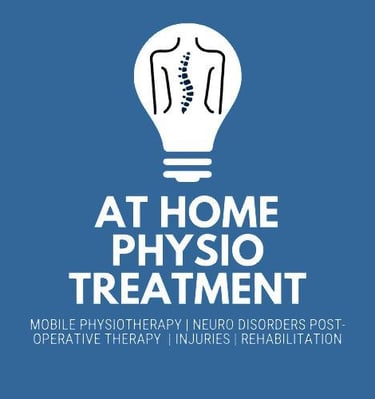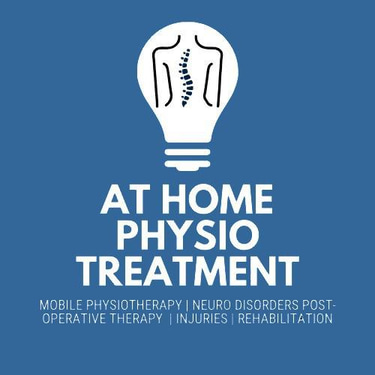The Benefits of Home-Based Physiotherapy
Personalized and One-on-One Attention, Convenience and Comfort, Customized Treatment in a Real-Life Setting, Faster Recovery and Better Outcomes, Greater Flexibility and Personalized Scheduling, Suitable for Chronic Conditions or Long-Term Care
PHYSIOTHERAPY
10/18/20244 min read


As people age or recover from injuries, physiotherapy plays a critical role in regaining strength, improving mobility, and enhancing overall quality of life. While physiotherapy is often provided in clinics or hospitals, home private physiotherapy is becoming increasingly popular due to its numerous advantages. Receiving care at home allows individuals to enjoy personalized treatment in a familiar and comfortable environment, leading to better outcomes and a more convenient experience.
Here are some of the key benefits of opting for home private physiotherapy:
1. Personalized and One-on-One Attention
Home physiotherapy ensures that the patient receives undivided attention from the therapist. Without the distractions and busy schedules often seen in clinics, private physiotherapists can fully focus on tailoring treatment plans to suit the patient's specific needs. This individualized care leads to more effective outcomes, as the therapist can carefully monitor progress and make real-time adjustments to exercises and therapies.
2. Convenience and Comfort
One of the greatest benefits of home private physiotherapy is the convenience it offers. Patients do not need to travel to clinics, making it particularly helpful for those with mobility issues, chronic pain, or transportation challenges. Receiving therapy at home eliminates the stress of commuting, allowing patients to focus entirely on their recovery.
The familiarity of the home environment can also make patients feel more at ease during their sessions, leading to improved mental and emotional well-being. Being comfortable in their surroundings can help patients stay relaxed and more cooperative during therapy.
3. Customized Treatment in a Real-Life Setting
In a clinic, patients may practice exercises on machines or equipment that are not readily available at home. However, home physiotherapy enables patients to learn exercises and techniques using their own furniture and living space. This makes the therapy more practical and applicable to daily life, helping patients develop the skills they need to navigate their homes safely.
For example, therapists can assess hazards in the home, recommend modifications (like handrails or anti-slip mats), and show patients how to perform exercises using household items. This personalized approach better equips patients to manage their condition in their everyday environment, promoting greater independence.
4. Faster Recovery and Better Outcomes
With private physiotherapy at home, patients often see quicker improvements in their condition. The convenience of having the therapist come to the patient allows for more consistent sessions, which can accelerate recovery. Additionally, one-on-one care means that the physiotherapist can focus solely on the patient, addressing any issues immediately and adjusting the treatment plan as needed.
The familiar environment of home also enables patients to feel less anxious and more motivated, which positively impacts their commitment to the recovery process. Reduced stress, combined with the benefits of personalized care, contributes to better long-term outcomes.
5. Family Involvement and Support
Home private physiotherapy allows family members or caregivers to be more involved in the patient’s rehabilitation process. This can be beneficial for several reasons:
Family members can observe the exercises and techniques, which helps them assist the patient between sessions.
They can provide emotional support and motivation, which is crucial for the patient’s recovery and mental well-being.
Physiotherapists can educate family members on how to create a safe and supportive home environment, ensuring that the patient can continue to improve even when the therapist is not present.
Involving the family helps reinforce the therapy process, increasing the chances of successful rehabilitation.
6. Greater Flexibility and Personalized Scheduling
Unlike traditional clinical settings where appointments are set at fixed times, home private physiotherapy offers greater flexibility in scheduling sessions. Patients can book appointments at times that suit their daily routine, reducing the disruption to their lives. This flexibility is especially useful for people with busy schedules, chronic conditions, or varying energy levels who may need to adapt their therapy times as their condition changes.
7. Enhanced Privacy and Comfort
For many people, privacy is an important factor in their healthcare experience. Some individuals may feel self-conscious about their physical limitations or health conditions, and they may prefer to receive treatment in the privacy of their home rather than a public clinic. Home private physiotherapy offers a discreet and comfortable experience, allowing patients to focus on their progress without feeling judged or embarrassed.
8. Suitable for Chronic Conditions or Long-Term Care
Patients with chronic conditions such as arthritis, multiple sclerosis, or long-term injuries often require ongoing physiotherapy. Home private physiotherapy is an ideal solution for such individuals, as it allows them to receive continuous care without the burden of traveling to clinics regularly. By receiving therapy at home, these patients can maintain their health and mobility over the long term with less physical strain and more flexibility in their care.
9. Cost-Effectiveness Over Time
While private home physiotherapy may seem more expensive upfront than clinic visits, it can actually be more cost-effective in the long run. Patients save money on transportation, parking fees, and any potential costs associated with frequent clinic visits. Additionally, the personalized and efficient nature of home care often leads to faster recovery times, which can reduce the overall number of sessions required.
Conclusion
Home private physiotherapy offers a highly personalized, convenient, and effective way for patients to receive the care they need. Whether recovering from surgery, managing a chronic condition, or aiming to improve mobility, receiving treatment in the comfort of home allows for greater comfort, flexibility, and focus on achieving the best possible outcomes. With the added benefits of family involvement, privacy, and practical exercises tailored to the home environment, home physiotherapy is an excellent choice for anyone looking to enhance their rehabilitation experience and achieve long-term health benefits
CONTACTS
WhatsApp Chat Line: +44 7376 030885


Copyright© At Home Physio Treatment 2025. All right reserved
